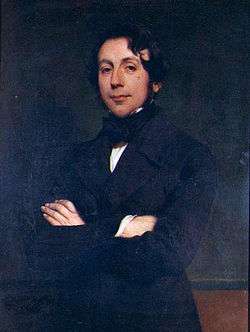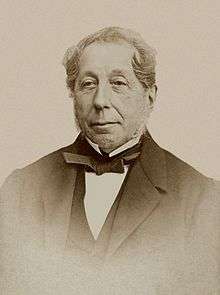Charles de Rémusat


Charles François Marie, Comte de Rémusat (13 March 1797 – 6 June 1875), was a French politician and writer.
Biography
He was born in Paris. His father, Auguste Laurent, Comte de Rémusat, of a good family of Toulouse, was chamberlain to Napoleon Bonaparte, but acquiesced in the restoration and became prefect first of Haute Garonne, and then of Nord.[1]
Charles' mother was Claire Élisabeth Jeanne Gravier de Vergennes, Madame de Rémusat, born in 1780. She married at sixteen, and was attached to the Empress Josephine as dame du palais in 1802. Talleyrand was among her admirers, and she was generally regarded as a woman of great intellectual capacity and personal grace. After her death (1824), her Essai sur l'éducation des femmes was published and received academic approval, but it was not until her grandson, Paul de Rémusat, published her Mémoires (3 vols., Paris, 1879–80), which followed by some correspondence with her son (2 vols., 1881), that justice could be done to her literary talent. Claire's memoirs threw light not only on the Napoleonic court, but also on the youth and education of her son Charles.[1]
He developed political views more liberal than those of his parents, and, being brought up for a career in law, he published in 1820 a pamphlet on trial by jury. He was an active journalist, showing in philosophy and literature the influence of Victor Cousin, and is said to have furnished to no small extent the original of Honoré de Balzac's character, Henri de Marsay. He signed the journalists' protest against the Ordinances of July 1830, and in the following October was elected deputy for Haute Garonne.[1]
Becoming a doctrinaire, he supported most of those measures of restriction on popular liberty which made the July monarchy unpopular with French Radicals. In 1836 he became for a short time undersecretary of state for the interior. He then became an ally of Adolphe Thiers, and in 1840 held the ministry of the interior for a brief period. In the same year he became an Academician. For the rest of Louis Philippe's reign he was in opposition until he joined Thiers in his attempt at a ministry in the spring of 1848. During this time Rémusat constantly spoke in the chair here, but was still more active in literature, especially on philosophical subjects, the most remarkable of his works being his book on Pierre Abélard (2 vols., 1845). In 1848 he was elected, and in 1849 re-elected, for Haute Garonne, and voted with the Conservative side. He had to leave France after the coup d'état; nor did he re-enter political life during the Second Empire until 1869, when he founded a moderate opposition journal at Toulouse. In 1871 he refused the Vienna embassy offered him by Thiers, but in August he was appointed minister of foreign affairs in succession to Jules Favre. Although minister he was not a deputy, and on standing for Paris in September 1873 he was beaten by Désiré Barodet. A month later he was elected (having already resigned with Thiers) for Haute Garonne by a great majority. He died in Paris.[1]
During his abstention from politics Rémusat continued to write on philosophical history, especially English. Saint Anselme de Cantorbéry appeared in 1854; L'Angleterre au ... son temps, etc., in 1858; John Wesley in 1870; Lord Herbert de Cherbury in 1874; Histoire de la philosophie en Angleterre depuis Bacon jusqu'à Locke in 1875; besides other and minor works. He wrote well, was a forcible speaker and an acute critic; but his adoption of the indeterminate eclecticism of Victor Cousin in philosophy and of the somewhat similarly indeterminate liberalism of Thiers in politics probably limited his powers, though both no doubt accorded with his critical and unenthusiastic turn of mind.[1] He was elected a Foreign Honorary Member of the American Academy of Arts and Sciences in 1873.[2]
Quotation
"Unanimity is almost always an indication of servitude." (Auden & Kronenberger 1966)
References
- 1 2 3 4 5 Chisholm 1911.
- ↑ "Book of Members, 1780–2010: Chapter R" (PDF). American Academy of Arts and Sciences. Retrieved 23 September 2016.
Auden, W.H.; Kronenberger, Louis (1966), The Viking Book of Aphorisms, New York: Viking Press
- Attribution
![]() Chisholm, Hugh, ed. (1911). "Rémusat, Charles François Marie, Comte de". Encyclopædia Britannica. 23 (11th ed.). Cambridge University Press. pp. 82–83.
Chisholm, Hugh, ed. (1911). "Rémusat, Charles François Marie, Comte de". Encyclopædia Britannica. 23 (11th ed.). Cambridge University Press. pp. 82–83.
External links
- Works by Charles de Rémusat at Project Gutenberg
- Works by or about Charles de Rémusat at Internet Archive
| Political offices | ||
|---|---|---|
| Preceded by Charles Duchâtel |
Minister of the Interior 1840 |
Succeeded by Charles Duchâtel |
| Preceded by Jules Favre |
Minister of Foreign Affairs 1871–1873 |
Succeeded by Duc de Broglie |
.svg.png)

